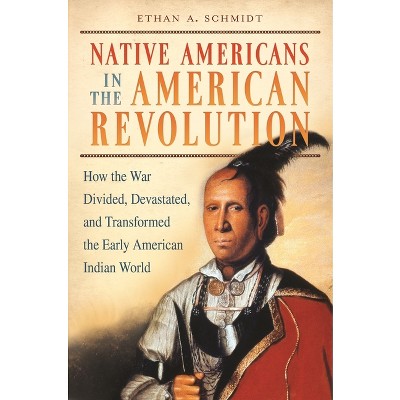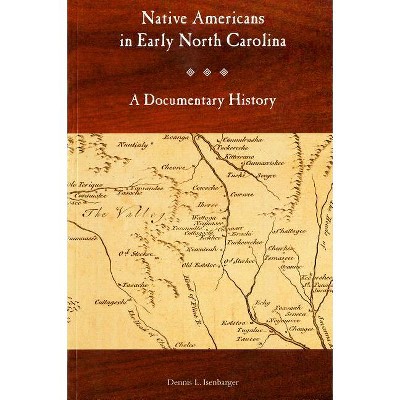Sponsored

Self-Determination and the Social Education of Native Americans - by Guy B Senese (Hardcover)
In Stock
Sponsored
About this item
Highlights
- Self-determination, a crucial conceptual development in American Indian social and educational policy and the force behind current Indian policy programs, is critically analyzed in this volume by a scholar/educator who has worked closely with Native Americans.
- About the Author: GUY B. SENESE is Assistant Professor of Leadership and Educational Policy Studies at Northern Illinois University.
- 248 Pages
- Education, General
Description
About the Book
Self-determination, a crucial conceptual development in American Indian social and educational policy and the force behind current Indian policy programs, is critically analyzed in this volume by a scholar/educator who has worked closely with Native Americans. Guy B. Senese explores the wide gulf between the rhetoric and the reality of self-determination in contemporary Native American education, an area that has received little scrutiny by students of American education policy. Senese contends that many aspects of Native American self-determination policy work against the full realization of that policy and are in fact contradictory. Arguing that self-determination is not a unified, coherent policy moving toward more community and tribal self-government and economic self-help, Senese makes a strong case for his theory that the policy has been a vehicle to promote a smooth transition toward a termination of the tribal/federal relationship. This book is an excellent addition to the developing literature that questions the pluralist assumptions of the late twentieth century liberal/progressive social policy.
Each of the volume's three parts addresses a basic assumption of Native American social education policy. Part I shows how self-determination policy grew as a response to the moral requirements of reservation development in a political climate of American patriotism. Part II shifts the focus more directly to schooling, including a discussion of the concept of community control and the 1975 Self-Determination and Educational Assistance Act. The concluding section analyzes the dialogue that resulted from the fragmentation of Native Americans, who were divided over the meaning of self-determination. How the concepts of trust and sovereignty have created grounds for the expropriation of the meaning of self-determination is also explored. This volume's analysis of American Indian social and educational policy makes it required reading in the areas of Ethnic Studies, Educational Policy Studies, Ethnohistory, and Sociology of Education. The work is an important addition to the Education and Ethnic Studies collections of public and university libraries.
Book Synopsis
Self-determination, a crucial conceptual development in American Indian social and educational policy and the force behind current Indian policy programs, is critically analyzed in this volume by a scholar/educator who has worked closely with Native Americans. Guy B. Senese explores the wide gulf between the rhetoric and the reality of self-determination in contemporary Native American education, an area that has received little scrutiny by students of American education policy. Senese contends that many aspects of Native American self-determination policy work against the full realization of that policy and are in fact contradictory. Arguing that self-determination is not a unified, coherent policy moving toward more community and tribal self-government and economic self-help, Senese makes a strong case for his theory that the policy has been a vehicle to promote a smooth transition toward a termination of the tribal/federal relationship. This book is an excellent addition to the developing literature that questions the pluralist assumptions of the late twentieth century liberal/progressive social policy.
Each of the volume's three parts addresses a basic assumption of Native American social education policy. Part I shows how self-determination policy grew as a response to the moral requirements of reservation development in a political climate of American patriotism. Part II shifts the focus more directly to schooling, including a discussion of the concept of community control and the 1975 Self-Determination and Educational Assistance Act. The concluding section analyzes the dialogue that resulted from the fragmentation of Native Americans, who were divided over the meaning of self-determination. How the concepts of trust and sovereignty have created grounds for the expropriation of the meaning of self-determination is also explored. This volume's analysis of American Indian social and educational policy makes it required reading in the areas of Ethnic Studies, Educational Policy Studies, Ethnohistory, and Sociology of Education. The work is an important addition to the Education and Ethnic Studies collections of public and university libraries.Review Quotes
?A well-documented, timely, and sobering critical analysis of the US Government's conflicting social education policy as applied to American Indians during the "self-determination" period. Senese dialectically views the language of democratic ethnic pluralism and the constitutional limitations of the federal Indian trust relationship. He cogently argues that the governments' American Indian education policy is hopelessly confounded with and inseparable from its social and economic-development activities, to the extent that an inherent contradiction exists between the policy's rhetorical and operational forms. Starting with Collier's "New Deal," and more recently, "self-determination," the author clearly traces 20th-century liberal progressivism and the Ford Foundation's support of the functional, social-scientific management and socialization of American Indians. After WW II human capital development planners, worked to create the "human and material conditions for a justifiable termination" of the government's trust and treaty obligations to American Indians. For those American Indians and their friends supporting "self-determination" as logically extending tribal sovereignty through economic development, community democracy, and contract schools, this book provides a much needed reality check. With substantial references and useful index, it should be required reading for faculty and graduate and upper-level undergraduate students in philosophical, social, educational, economic, political and legal studies.?-Choice
"A well-documented, timely, and sobering critical analysis of the US Government's conflicting social education policy as applied to American Indians during the "self-determination" period. Senese dialectically views the language of democratic ethnic pluralism and the constitutional limitations of the federal Indian trust relationship. He cogently argues that the governments' American Indian education policy is hopelessly confounded with and inseparable from its social and economic-development activities, to the extent that an inherent contradiction exists between the policy's rhetorical and operational forms. Starting with Collier's "New Deal," and more recently, "self-determination," the author clearly traces 20th-century liberal progressivism and the Ford Foundation's support of the functional, social-scientific management and socialization of American Indians. After WW II human capital development planners, worked to create the "human and material conditions for a justifiable termination" of the government's trust and treaty obligations to American Indians. For those American Indians and their friends supporting "self-determination" as logically extending tribal sovereignty through economic development, community democracy, and contract schools, this book provides a much needed reality check. With substantial references and useful index, it should be required reading for faculty and graduate and upper-level undergraduate students in philosophical, social, educational, economic, political and legal studies."-Choice
About the Author
GUY B. SENESE is Assistant Professor of Leadership and Educational Policy Studies at Northern Illinois University. He has taught at the Rough Rock Demonstration School on the Navajo reservation, served as youth advocate/counselor with Tlingit-Haida youth in Juneau, Alaska, and worked as Illinois State Board of Education Specialist in Compensatory Education. Dr. Senese's articles have appeared in Educational Theory, Harvard Educational Review, Educational Foundations, and Journal of Thought.Shipping details
Return details
Frequently bought together
Trending Non-Fiction


















